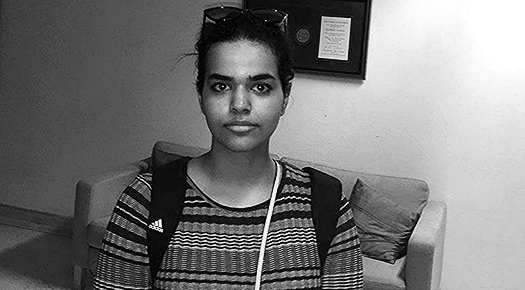
Photo Credit: Public Broadcasting System
The 18-year-old woman who renounced Islam was trying to escape Saudi Arabia out of fear her parents will kill her. Rahaf Mohammed al-Qunun was first stopped at a Bangkok airport by Thai immigration police, denied entry and had her passport seized. After that, she barricaded herself in an airport hotel room and launched a social media campaign on Twitter, which drew enough support to convince Thai officials to admit her temporarily under the protection of UN officials. The UNHCR eventually granted her refugee status on Wednesday and several countries, including Canada and Australia, had been in talks with the United Nations refugee agency to accept her.
During the late 20th and early 21st centuries, women's rights in Saudi Arabia were limited in comparison to the rights of women in many of its neighboring countries due to the strict interpretation of sharia law Saudi Arabia has in place. Saudi Arabia has no penal code, and defaults its law entirely to Sharia and its implementation to religious courts. The case law in Saudi Arabia and consensus of its jurists is that Islamic law imposes the death penalty on apostates. For example, Saudi authorities charged Hamza Kashgari, a Saudi writer, in 2012 with apostasy based on comments he made on Twitter. In 2015, a man in Saudi Arabia was sentenced to death for apostasy.
Canadian Prime Minister Justin Trudeau made the announcement to reporters about this case:
“The [UN High Commissioner for Refugees] has made a request of Canada that we accept Ms. al-Qunun as a refugee and we have accepted the UN’s request that we grant her asylum,” he told reporters.
"Canada has always been unequivocal that we will always stand up for human rights and women's rights around the world," Trudeau said.
"This is part of a long tradition of Canada engaging constructively in the world and working with our partners, allies and the United Nations. When the United Nations made a request that we grant Ms. al-Qunun asylum we accepted."
Thailand’s immigration chief told reporters earlier on Friday that she’s already on her way to Canada. “Canada has granted her asylum,” Surachate Hakpark told Reuters. “She’ll leave tonight at 11:15 p.m.,” which is 11:15 a.m. ET.
The UN agency thanked both governments for their quick response and specifically thanked Canada for accepting al-Qunun and arranging her travel.
"Refugee protection today is often under threat and cannot always be assured, but in this instance international refugee law and overriding values of humanity have prevailed," UN High Commissioner for Refugees Filippo Grandi said in a statement.
The statement said the "fast-track" mechanism that allowed for al-Qunun to come to Canada so quickly "is available only to a fraction of the world's 25.4 million refugees, typically those at greatest risk, such as women at risk."
